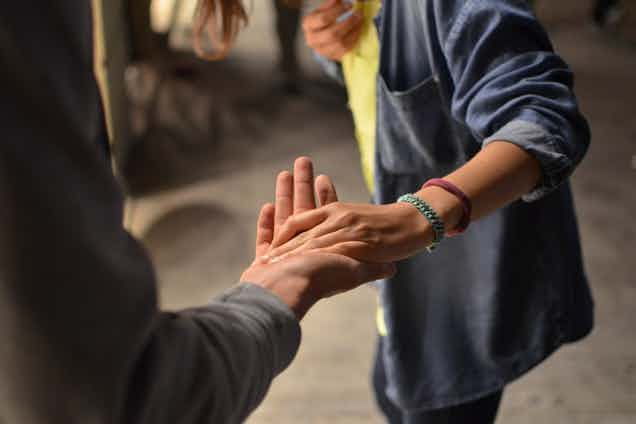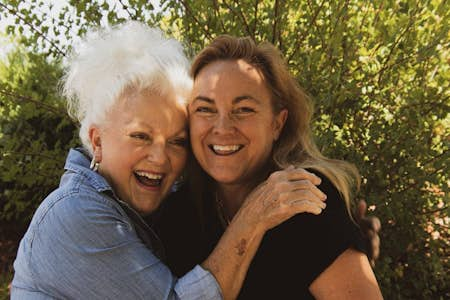Our local areas are growing and changing. As technology advances and transport links improve, we don’t have to rely on neighbours for company. A rise in renting sees residents come and go. Chains replace locally-owned shops, and new developments extend our neighbourhoods. It’s easy to feel left behind.
But change can be good for communities, too. We see better transport links, regeneration in much-needed areas, new services, and access to exciting job opportunities. But how can we build a sense of community in these changing local areas?
1. Join or start a community group
Community projects allow you to meet new people and bring residents together for a good cause. They can also sometimes reach people that public or private sector organisations might miss. Community groups might be run by a charity or set up by residents who know which issues matter locally. Charities will be able to point you in the direction of volunteering opportunities.
The Eden Project studied the impact of community projects and found that participants make, on average, 20 connection when they take part. Eight in ten people then continue to socialise with new connections outside of the project.
Community groups can have a positive effect on local well-being and health care, too. According to The Guardian, the London School of Economics found that a typical befriending service costs £80 per person per year but produces £300 worth of value per person. These savings are based on the reduced need for treatment and the better quality of life resulting from improved mental health.
2. Connect with young people
It’s easy to get caught up in our perceptions of what people are like, especially when it comes to generational differences. Research from the University of Sheffield found that both older and younger people feel discriminated against because of the labels attached to them.
Older and younger people have different experiences of local life, and both generations could benefit from building a sense of community. As the Liverpool Cares charity website explains:
“Many older people have deep roots [in their local area] but few connections. Meanwhile, young people – often students and graduates from across the country and around the world – can have hundreds of connections in the social media age, but often no roots in their communities.”
The Cares Family is a group of registered charities that bridge this gap, connecting older and younger people across London and the North West. The organisation creates friendships and a sense of community in what they call a “disconnected age”. You can get involved in their activities, including matching older and younger neighbours, organising social clubs, and fundraising.
3. Help with crime prevention
It’s hard to feel connected with your community if you’re worried about crime. While it’s important to be wary of crime, it can become disproportionate. Research shows that fear of crime is contagious, leading to generalised fear even where crime rates are low.
Instead of fearing others in your local area, they could become an asset. You might decide to team up with local charities or join a scheme such as Neighbourhood Watch. This might include raising awareness of safety-related precautions people can take, such as making sure homes don’t look vacant when owners are on holiday.
Neighbourhood Watch has over 90,000 volunteer coordinators aiming to make their communities safer. A National College of Policing review suggests that for every 100 UK crimes, an average of 15 crimes were prevented with Neighbourhood Watch.
4. Developing community spirit through your local authority
Some local authorities have initiatives that aim to foster a sense of community. In Scotland, every local authority area must have a community family partnership involving public sector bodies working with local businesses, charities, and voluntary groups to deliver better services.
You might be able to get a grant to start your community project, depending on what’s available in your area. Get in touch with your local council to find out what they offer and how they work with community-based projects.
5. Start a hobby group
Group activities give people the chance to get together and formalise their hobbies, developing new skills. Research also shows that engaging in hobbies for at least one hour a day could protect against dementia in later life. This means your group could be helping to improve mental well-being in your local area, too.
It’s up to you how structured you want the group to be. It could be a simple "knit and natter" style group at a local café, or you could bring in an experienced instructor.
6. Create a community garden
Taming or creating new green spaces can improve your local area aesthetically and build community spirit. Research suggests that positive interactions in urban green spaces can lead to social cohesion and health-promoting behaviours. Why not make improving green spaces a collaborative activity where people can meet and work towards a common goal?
We spoke to Dave Morris from the National Federation of Parks and Green Spaces, who told Age Times: "Our local parks and green spaces are major assets for our neighbourhoods and provide great opportunities for strengthening community interaction and initiative.
"Over the last 20 years over 7,000 local 'Friends of Parks' groups have been set up by people who love their local greenspace and what to ensure that it is well used, protected, improved and thriving. We encourage people to get involved in the activities of such groups, or help set up new ones where they don't yet exist but are much needed!"
You need to do a few things before designing and maintaining the garden, such as seeking permission, getting the proper insurance, completing risk assessments, and surveying the site. But don't let that put you off! The Royal Horticultural Society website has a comprehensive guide to help residents set up a community garden.
7. Clean up your local area
How your community looks is important. Organising or participating in clean-ups means you can take pride in your local area and reap the benefits of a tidier neighbourhood.
Organisations like Keep Britain Tidy aim to reduce waste and litter and change people's habits so that future generations can benefit from a better environment. From 28th May to 13th June, they will host the Great British Spring clean. They are also asking people to join their Million Mile Mission, where individuals can pledge up to 24 hours of litter picking at a time.
8. Help people stay active
Sport England believes that communities can benefit through the power of physical activity. They say that sport can help build bridges between people from different backgrounds or with different experiences.
Sports can help bring communities together and provide that extra motivation to get healthier, too. The NHS website recommends that adults should aim to be physically active every day. Regular exercise helps with sleep, lowers the risk of developing chronic diseases, and can improve mental health. Older adults can also benefit from balance exercises to help reduce the risk of falling.
There are plenty of ways to get involved with promoting sport in your local area, and you certainly wouldn’t be alone! Sport England has a volunteer advice page, where they state that 6.2 million adults give their time at least twice a year to help make sport and physical activity happen.
9. Work in the community
If your community is important to you, he might enjoy a job working with people locally. There are plenty of ways to get involved professionally. You could teach, work with a local charity, find a role within the NHS, or even start a business.
For more inspiration, look at our recent article detailing eight jobs you can do in the community. If you’re retired, you might enjoy working for a few hours a week, meeting others with the same interests, and using problem-solving skills for the well-being of residents.
What is it that creates a sense of community?
The dictionary defines the term community as “the people living in one particular area or people who are considered as a unit because of their common interests, social group, or nationality”. So communities exist everywhere, but our experiences of them are different.
There have been debates over how to define and measure people’s sense of community. In the 1980s, an article published in the Journal of Community Psychology proposed an answer. David MacMillan and David Chavis describe four elements that make up a sense of community:
- Membership
- Influence
- Integration and fulfilment of needs
- Shared emotional connection
Although researchers provide complex descriptions of what a sense of community really is, you might find a more straightforward answer by considering the communities around you. What is it that brings everyone together? Why is community important to you? What do you want a community to achieve?
Other types of communities
If you’re missing a sense of community, you might be able to find something excellent outside your local area. There are plenty of communities out there that share common interests and goals.
Online communities
Finding a community online is much easier when you know where to look. If you have a specific hobby or interest, you can search for Facebook groups set up by like-minded people. Or, you might find an online book club, e-learning classes, or even an app dedicated to building community spirit.
It's lovely to connect with new people, but remember to be vigilant when joining new online communities.
Adventurous communities
People who enjoy travelling often feel they are part of a specific community. That might be regular holidaymakers to a particular area, backpackers around a certain part of the world, or people who travel with a specific organisation.
For example, WWOOF stands for WorldWide Opportunities on Organic Farms. WWOOFers travel worldwide, volunteering their time in exchange for accommodation and the opportunity to explore a new place. Hosts are vital to the community, too, creating memorable experiences.
Work-related communities
If you're retired, you might find that you start to lose the sense of community you had in your specific industry. But there are often ways to stay connected. You could keep in touch with former colleagues, continue to network, or maintain your professional accreditation so that you can work part-time if you want to.








